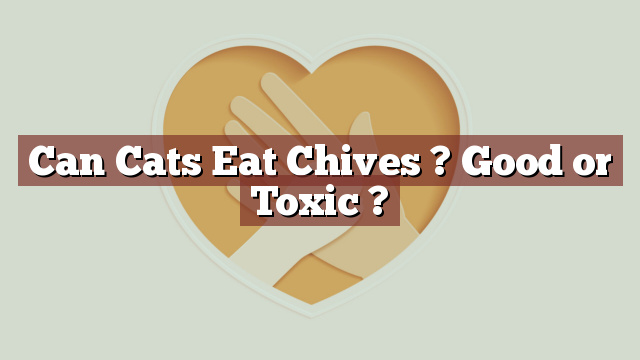Can Cats Eat Chives? Good or Toxic?
As responsible pet owners, it is crucial to be aware of what foods are safe for our furry companions. While cats have specific dietary needs, it is important to understand whether certain foods, such as chives, can be included in their diet. In this article, we will explore the nutritional value of chives, safety considerations for felines, potential risks or benefits, and what steps to take if your cat consumes chives.
Nutritional Value of Chives: Vitamins, Minerals, and More
Chives, part of the allium family, are known for their distinctive onion-like flavor and are commonly used in various culinary dishes. These slender green herbs are rich in essential nutrients, including vitamins A, C, and K, as well as minerals like calcium and iron. Additionally, chives contain antioxidants that may provide certain health benefits.
Can Cats Eat Chives? Safety Considerations for Felines
No, cats should not eat chives. While chives may offer nutritional value to humans, they can be potentially harmful to felines. Chives contain compounds known as thiosulphates, similar to those found in onions and garlic. These thiosulphates can cause oxidative damage to a cat’s red blood cells, leading to a condition called hemolytic anemia.
Scientific research and veterinary insights indicate that cats lack the necessary enzymes to safely process these compounds. Even small amounts of chives can have adverse effects on a cat’s health. Therefore, it is best to avoid feeding chives to your feline companion.
Potential Risks or Benefits of Chives for Cats
The potential risks of cats consuming chives outweigh any possible benefits. While chives may offer certain nutritional value, such as vitamins and minerals, these can be obtained through other safe and appropriate sources in a cat’s diet. Feeding chives to cats can lead to serious health complications, including anemia and digestive issues.
What to Do if Your Cat Eats Chives: Immediate Steps to Take
If you suspect or witness your cat consuming chives, it is important to take immediate action. Contact your veterinarian and describe the situation in detail. They will provide guidance based on your cat’s specific circumstances. Depending on the amount consumed and the cat’s overall health, your vet may recommend inducing vomiting or performing other necessary treatments to prevent potential complications.
Conclusion: Chives and Cats – Proceed with Caution
In conclusion, cats should not consume chives due to the potential harm they can cause. While chives have nutritional value for humans, they can be toxic to felines, leading to serious health issues. It is crucial to prioritize the well-being of our pets by ensuring they have a safe and appropriate diet. Consulting with a veterinarian to establish a proper nutritional plan for your cat is always recommended. Remember, when it comes to chives and cats, it’s best to proceed with caution and avoid any potential risks.
Thank you for investing your time in exploring [page_title] on Can-Eat.org. Our goal is to provide readers like you with thorough and reliable information about various dietary topics. Each article, including [page_title], stems from diligent research and a passion for understanding the nuances of our food choices. We believe that knowledge is a vital step towards making informed and healthy decisions. However, while "[page_title]" sheds light on its specific topic, it's crucial to remember that everyone's body reacts differently to foods and dietary changes. What might be beneficial for one person could have different effects on another. Before you consider integrating suggestions or insights from "[page_title]" into your diet, it's always wise to consult with a nutritionist or healthcare professional. Their specialized knowledge ensures that you're making choices best suited to your individual health needs. As you navigate [page_title], be mindful of potential allergies, intolerances, or unique dietary requirements you may have. No singular article can capture the vast diversity of human health, and individualized guidance is invaluable. The content provided in [page_title] serves as a general guide. It is not, by any means, a substitute for personalized medical or nutritional advice. Your health should always be the top priority, and professional guidance is the best path forward. In your journey towards a balanced and nutritious lifestyle, we hope that [page_title] serves as a helpful stepping stone. Remember, informed decisions lead to healthier outcomes. Thank you for trusting Can-Eat.org. Continue exploring, learning, and prioritizing your health. Cheers to a well-informed and healthier future!

